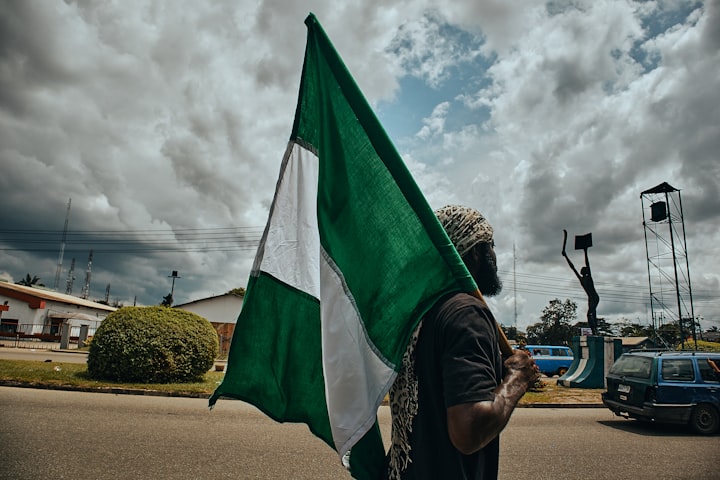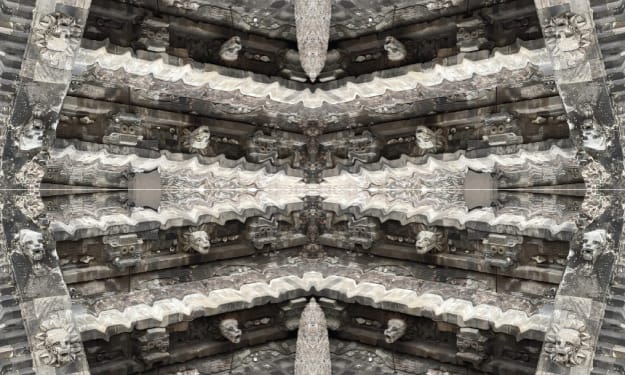Content warning
This story may contain sensitive material or discuss topics that some readers may find distressing. Reader discretion is advised. The views and opinions expressed in this story are those of the author and do not necessarily reflect the official policy or position of Vocal.
"Resilience and Diversity: A Comprehensive History of Nigeria"
From Ancient Civilizations to Contemporary Challenges"

Introduction
The history of Nigeria is a tapestry woven with threads of pre-colonial civilizations, the transatlantic slave trade, colonial rule, independence struggles, and post-independence challenges and triumphs. Spanning millennia, Nigeria's story is one of resilience, cultural diversity, political upheaval, and economic transformation.
Pre-Colonial Nigeria
Ancient Civilizations
Nigeria's history dates back to ancient times, with evidence of early human habitation found in archaeological sites like Dufuna and Igbo-Ukwu. Notable ancient civilizations such as the Nok, Ife, and Benin kingdoms flourished, leaving behind remarkable artifacts and cultural legacies.
Trans-Saharan Trade
Nigeria was a hub for the trans-Saharan trade route, connecting West Africa with North Africa and beyond. The trade in gold, salt, and other commodities fostered economic prosperity and cultural exchange.
Fulani Jihad and the Sokoto Caliphate
In the early 19th century, the Fulani Jihad led by Usman dan Fodio established the Sokoto Caliphate, one of the largest pre-colonial states in Africa. This Islamic empire profoundly influenced the socio-political landscape of northern Nigeria.
Colonial Era
British Colonization
Nigeria became a British protectorate in the late 19th century, as the British Empire sought to exploit resources and expand its influence. The amalgamation of the Northern and Southern Protectorates in 1914 created the entity known as Nigeria, laying the groundwork for future tensions.
Indirect Rule and Resistance
The British implemented the policy of indirect rule, governing through traditional rulers in the north and colonial administrators in the south. However, resistance movements such as the Aba Women's Riots and the Egba Women's Tax Revolt challenged colonial authority.
Independence Struggle
Nationalist Movements
The mid-20th century saw the rise of nationalist movements demanding independence from colonial rule. Figures like Nnamdi Azikiwe, Obafemi Awolowo, and Ahmadu Bello played pivotal roles in advocating for self-governance and sovereignty.
Independence and First Republic
Nigeria gained independence from Britain on October 1, 1960, with a parliamentary system of government. The First Republic was marked by political instability, ethnic tensions, and the struggle for power among the country's diverse regions.
Post-Independence Challenges
Civil War
The Nigerian Civil War (1967-1970), also known as the Biafran War, erupted due to ethnic and political tensions, particularly between the Igbo-dominated southeast and the federal government. The conflict resulted in immense human suffering and loss of life.
Military Coups and Dictatorship
Nigeria experienced a series of military coups and counter-coups, leading to periods of authoritarian rule. Figures like General Yakubu Gowon, General Murtala Mohammed, and General Sani Abacha wielded power, often suppressing dissent and perpetuating corruption.
Return to Democracy
Transition to Civilian Rule
In 1999, Nigeria transitioned to civilian rule with the election of Olusegun Obasanjo as president, marking the end of military dictatorship. However, the country continued to grapple with challenges such as corruption, ethnic conflict, and economic inequality.
Fourth Republic
The Fourth Republic saw alternating power between the People's Democratic Party (PDP) and the All Progressives Congress (APC). While Nigeria made strides in economic growth and international diplomacy, issues like Boko Haram insurgency, militancy in the Niger Delta, and ethno-religious conflicts persisted.
Contemporary Nigeria
Economic Growth and Challenges
Nigeria's economy, driven by oil production, experienced periods of growth and contraction. However, over-reliance on oil revenue, corruption, and inadequate infrastructure hindered sustainable development and widened socio-economic disparities.
Cultural Diversity and Identity
Nigeria's rich cultural heritage, manifested in music, literature, art, and traditions, contributes to its vibrant national identity. However, ethnic diversity also fuels tensions, as seen in conflicts over resource allocation and political representation.
Future Prospects
As Nigeria navigates the 21st century, it faces both opportunities and challenges. Sustainable development, good governance, security, and nation-building remain paramount for the country to fulfill its potential as a regional powerhouse and global player.
Conclusion
Nigeria's history is a testament to the resilience of its people and the complexities of nation-building in a diverse and dynamic society. From ancient civilizations to modern challenges, Nigeria's journey reflects the triumphs and tribulations of a nation striving for unity, progress, and prosperity.
This outline provides a framework for delving into the multifaceted history of Nigeria within a 10,000-word limit. Each section can be expanded with more detail, analysis, and examples to provide a comprehensive understanding of Nigeria's past, present, and future.
About the Creator
Enjoyed the story? Support the Creator.
Subscribe for free to receive all their stories in your feed. You could also pledge your support or give them a one-off tip, letting them know you appreciate their work.
Reader insights
Nice work
Very well written. Keep up the good work!
Top insights
Easy to read and follow
Well-structured & engaging content
Expert insights and opinions
Arguments were carefully researched and presented
Eye opening
Niche topic & fresh perspectives





Comments (2)
Nice
wow